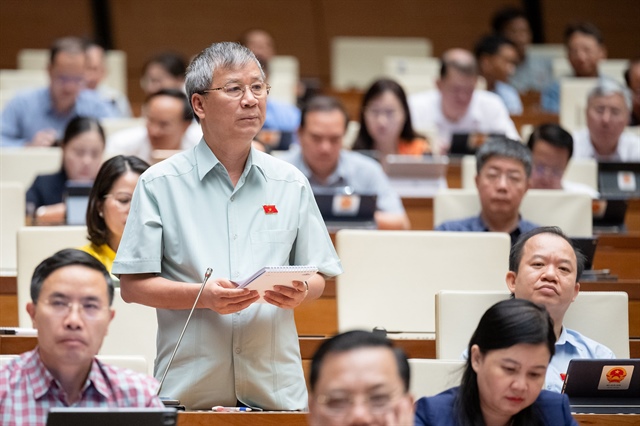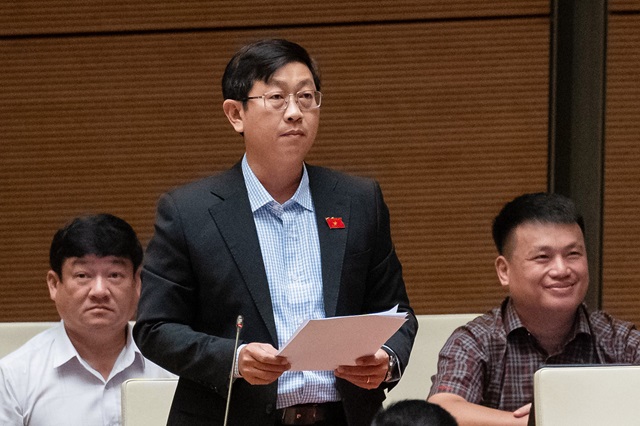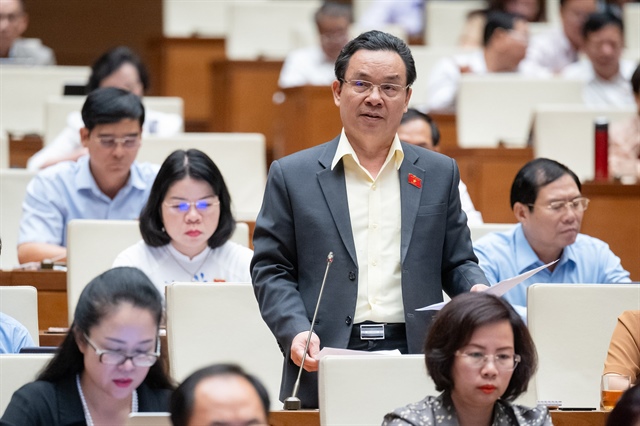On May 25, the National Assembly discussed the supervision team’s report on the implementation of Resolution No. 43/2022/QH15, dated January 11, 2022, on fiscal and monetary policies supporting the Program for socio-economic recovery and development, along with the National Assembly’s resolutions on several important national projects until the end of 2023.
A significant number of National Assembly deputies shared their opinions on the issue of a portion of officials and civil servants evading and shirking responsibility in the performance of their duties.
Deputy Nguyen Anh Tri from Hanoi stated that the supervision report pointed out five groups of existing problems and limitations, three groups of objective reasons, and four groups of subjective reasons in the implementation of Resolution 43 and the National Assembly’s resolutions during the past period.

Deputy Nguyen Anh Tri. Photo: National Assembly
|
The deputy emphasized that what the report indicated was “correct and accurate.” Among those, he was particularly concerned about the third subjective reason regarding the situation of passing the buck, evading, and shirking responsibility among a section of officials and civil servants.
Deputy Anh Tri expressed: “This has become a kind of rapidly spreading disease within the ranks of those who perform public duties, at all levels and in all sectors, from 2022 to the end of 2023. The people are well aware of this. Some even consider it a prominent feature of officials and civil servants during this period, which is truly distressing and saddening.”
In his opinion, to curb this disease of evading and shirking responsibility, Party and government levels need to regard it as a negative situation. There is a need to identify and discipline those who pass the buck and shirk their responsibilities. At the same time, timely commendations should be given to officials who demonstrate the “seven dares,” especially those who dare to take responsibility…
Deputy Nguyen Huu Thong from Binh Thuan agreed that the primary cause of the limitations mentioned above is human-related. People propose and issue policies, and the implementation and deployment of these policies in reality are decisive factors in the success of those policies.
He also believed that the situation of passing the buck, evading, and shirking responsibility among a section of officials and civil servants is not only a cause but also a phenomenon. According to him, this phenomenon stems from two reasons.

Deputy Nguyen Huu Thong. Photo: National Assembly
|
Firstly, there are overlapping legal documents, and many regulations are impractical and outdated, creating risks for implementers and businesses. The procedures for implementing projects are complex and overlapping, leading to prolonged preparation times. Secondly, the capacity of civil servants to perform their duties remains limited.
Meanwhile, the process of resolving contradictions and overlaps in legal provisions and abolishing impractical regulations has been slow, especially for documents below the law level. The training of civil servants has not focused enough on specialized knowledge and professional skills.
According to Mr. Thong, the situation of passing the buck, evading, and shirking responsibility has been mentioned many times, but there has been little change.
“Is it because we lack a mechanism to evaluate and handle civil servants, or do we lack a mechanism to protect those who dare to think, dare to do, and dare to take responsibility for the common good? In my opinion, that is not the case. We already have many Party and government documents on evaluating officials, civil servants, and public employees. We also have Conclusion 14 of the Central Committee and Government Decree 73 on encouraging officials to dare to take responsibility for the common good. So, what is the reason?” Mr. Thong asked.
The deputy suggested that the National Assembly and the Government conduct a fundamental assessment, identify the exact causes, and propose truly effective solutions. It is necessary to survey and evaluate the implementation of Decree 73 since its issuance to determine which agencies, units, or localities have applied it and achieved positive results, so that these good practices can be replicated.

Deputy Hoang Van Cuong. Photo: National Assembly
|
To address the situation of officials being “rigid and afraid to act for fear of making mistakes” and to encourage dynamism, Deputy Hoang Van Cuong from Hanoi suggested that a resolution of the National Assembly should allow for the flexible application or selection of the most suitable legal provisions when performing public duties.
“Before implementing this, a plan of action must be drawn up, clearly indicating the reasons for creative application and how it differs from current regulations. This plan should be reported to the competent authority for approval, taking into account its feasibility, practicality, and compliance with legal prohibitions. At the same time, the implementation of the plan proposed by the person must be monitored and supervised to detect and promptly adjust any issues,” analyzed Deputy Cuong. He believed that if this could be achieved, it would be the “key” to creativity and daring to think and act.
Tran Thuong












